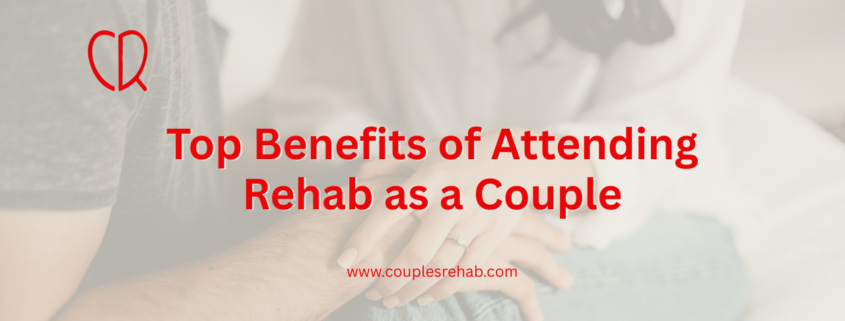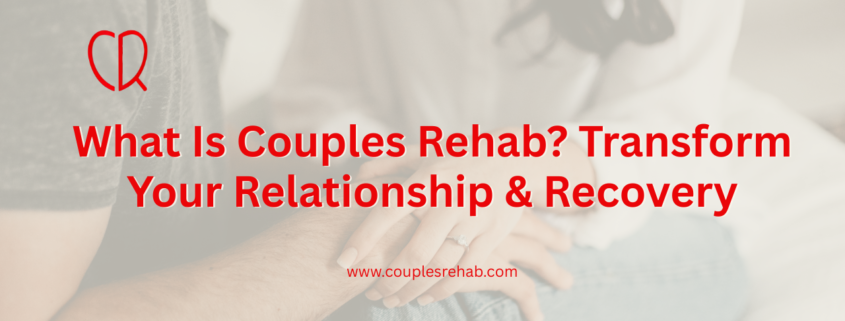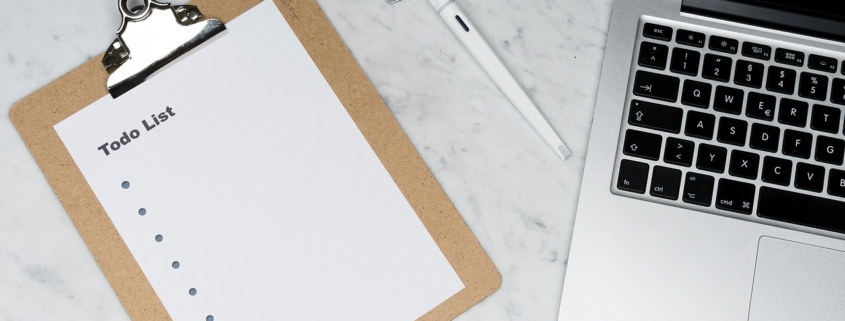In the challenging journey toward recovery from addiction, the path often feels lonely and isolating. However, when couples face addiction together, attending rehab as a unit can transform the recovery experience in profound ways. At Couples Rehab, we’ve witnessed remarkable transformations when partners commit to healing together rather than separately. This comprehensive guide explores the numerous advantages of couples rehabilitation programs and why they might be the right choice for you and your loved one.
Understanding the Concept of Couples Rehab
Couples rehab represents a specialized approach to addiction treatment designed specifically for romantic partners struggling with substance abuse issues. Whether both individuals are battling addiction or one partner is supporting the other through recovery, these programs provide tailored therapy that addresses both individual needs and relationship dynamics.
Unlike traditional rehabilitation programs that focus solely on the individual, couples rehab creates a healing environment where relationships can strengthen alongside personal recovery. This dual approach recognizes that addiction affects not just the person using substances, but their entire relationship ecosystem.
At Couples Rehab, our specialized programs integrate evidence-based addiction treatment with relationship counseling, creating a comprehensive healing approach that many find more effective than traditional single-person rehab experiences.
The Powerful Benefits of Recovering Together
1. Enhanced Mutual Understanding
When couples attend rehab together, they gain invaluable insights into each other’s struggles, triggers, and recovery needs. This shared experience creates a foundation of understanding that’s difficult to achieve when one partner undergoes treatment alone.
Through joint therapy sessions at Couples Rehab, partners learn to:
- Recognize and acknowledge each other’s unique challenges
- Understand the neurobiological aspects of addiction affecting their partner
- Identify how their actions might unintentionally enable or trigger substance use
- Develop empathy for the complex emotions underlying addictive behaviors
This enhanced understanding often becomes a cornerstone for long-term recovery success and relationship healing.
2. Improved Communication Skills
Communication breakdown frequently accompanies addiction, with secrets, lies, and misunderstandings becoming normalized. How does going to rehab together as a couple improve communication skills? The answer lies in the structured therapeutic environment that rehab provides.
In couples rehab programs, partners learn to:
- Express needs and emotions clearly without blame or judgment
- Listen actively and validate each other’s experiences
- Navigate difficult conversations about past hurts and future concerns
- Establish healthy communication patterns that support sobriety
These communication skills developed at Couples Rehab extend far beyond addiction discussions, enhancing all aspects of the relationship and creating pathways for ongoing intimacy and connection.
3. Addressing Codependency Head-On
Codependency and addiction often intertwine in complex ways, creating unhealthy relationship patterns that can perpetuate substance abuse. How does couples rehab address codependency in addiction recovery? Through specialized therapeutic interventions, couples learn to identify and transform these damaging dynamics.
At Couples Rehab, our experienced therapists help couples:
- Recognize codependent behaviors that enable addiction
- Establish healthy boundaries that support recovery
- Develop independent identities alongside their relationship identity
- Break cycles of control, rescuing, and emotional dependence
By addressing codependency directly in a supportive environment, couples can rebuild their relationship on healthier foundations that support long-term sobriety rather than undermining it.
4. Rebuilding Trust and Intimacy
Perhaps one of the most devastating impacts of addiction is the erosion of trust between partners. Secrets, lies, financial problems, and broken promises often leave deep relational wounds. Can attending rehab as a couple help rebuild trust after addiction? Clinical evidence and countless success stories from Couples Rehab suggest the answer is a resounding yes.
In the safe space of couples therapy within rehab:
- Partners can acknowledge betrayals and hurts in a mediated environment
- The addicted partner can demonstrate accountability and commitment to change
- Both individuals learn to rebuild trust gradually through consistent actions
- Couples develop intimacy-building practices that don’t revolve around substances
This process of rebuilding trust doesn’t happen overnight, but the structured environment of rehab provides an ideal setting to begin this crucial healing work.
5. Aligned Recovery Goals and Strategies
When partners attend rehab separately, they often develop different recovery languages, strategies, and goals. This misalignment can create friction during the challenging post-rehab transition. Attending Couples Rehab together ensures that partners:
- Create harmonized recovery plans that complement rather than conflict
- Learn the same therapeutic techniques and coping strategies
- Understand identical terminology and recovery concepts
- Develop shared rituals and practices that support ongoing sobriety
This alignment becomes particularly valuable during stressful periods when the risk of relapse increases, as both partners can draw from the same recovery toolbox.
6. Mutual Accountability System
What is the role of mutual support in couples rehab and its benefits? One of the most powerful advantages is the built-in accountability system. When couples recover together, they become natural accountability partners who can:
- Recognize each other’s early warning signs of potential relapse
- Provide immediate support during moments of craving or weakness
- Celebrate recovery milestones and achievements together
- Gently redirect behaviors that might compromise sobriety
At Couples Rehab, we help partners develop healthy accountability practices that support rather than police each other, creating a recovery partnership that significantly enhances long-term success.
7. Reduced Risk of Relapse
Individual relapse rates following traditional rehab programs remain discouragingly high. How does attending rehab as a couple reduce the risk of relapse for both partners? The answer lies in the comprehensive support system that couples create for each other.
Research suggests that couples who attend rehab together experience lower relapse rates due to:
- Constant reinforcement of recovery principles in daily life
- Removal of relationship stress as a potential relapse trigger
- Early intervention when one partner shows warning signs
- Mutual motivation to maintain sobriety for the relationship’s sake
At Couples Rehab, our aftercare planning specifically focuses on how partners can help safeguard each other’s sobriety while respecting individual recovery journeys.
8. Healing Family Systems
Addiction rarely affects only the couple; it typically impacts the entire family system, especially when children are involved. Couples rehab addresses these broader family dynamics by:
- Providing family therapy sessions alongside couples therapy
- Teaching parenting skills for families affected by addiction
- Helping couples present a united front in family recovery
- Creating strategies for rebuilding damaged family relationships
This family systems approach at Couples Rehab helps ensure that recovery extends beyond the partnership to heal the entire family unit.
9. Cost-Effective Treatment Option
While quality rehab always represents a significant investment, what are the cost considerations for choosing a couples rehab program? Interestingly, couples programs often provide greater value than two separate individual treatments.
When comparing options, couples may find:
- Shared accommodation reduces overall costs
- Insurance may provide better coverage for integrated programs
- Transportation and logistics costs are halved
- Post-rehab therapy needs may be lower due to built-in support
At Couples Rehab, our admissions team works directly with couples to maximize insurance benefits and find the most cost-effective treatment options without compromising quality of care.
10. Long-Term Relationship Viability
Perhaps the most profound benefit of couples rehab is its impact on relationship longevity. What are the long-term advantages of couples rehab for sustained sobriety? Beyond addiction recovery, couples often discover whether their relationship can thrive in sobriety.
The intensive therapeutic environment helps couples:
- Determine if the relationship remains viable without substances
- Rebuild a connection based on authentic rather than addicted selves
- Create a shared vision for a sober future together
- Develop relationship skills that support long-term happiness
Some couples discover their relationship cannot survive sobriety, which—while painful—prevents years of continued dysfunction. Others find their bond grows stronger than ever before, building a foundation for lasting recovery and happiness.
Specialized Therapeutic Approaches for Couples
Are there specific therapy approaches used in rehab for couples with addiction? Couples rehab utilizes several specialized therapeutic modalities designed specifically for relationship healing alongside addiction recovery.
Behavioral Couples Therapy (BCT)
This evidence-based approach directly addresses both relationship functioning and substance abuse issues. At Couples Rehab, our BCT programs include:
- Recovery contracts that outline expectations and supportive behaviors
- Communication skills training specific to addiction challenges
- Reinforcement of positive behaviors that support sobriety
- Joint activities that build connection while supporting recovery
Research consistently shows that BCT improves relationship satisfaction while simultaneously reducing substance use more effectively than individual treatments alone.
Emotionally Focused Therapy (EFT)
Addiction often serves as a maladaptive coping mechanism for deeper emotional wounds. EFT helps couples:
- Identify attachment injuries that may drive addictive behaviors
- Express vulnerable emotions in safe, structured ways
- Create new patterns of emotional connection
- Respond to each other’s emotional needs without substances
This approach has shown remarkable success at Couples Rehab, particularly for couples whose addiction issues stem from attachment insecurities or trauma histories.
Systems-Based Approaches
Recognizing that addiction exists within a relationship system, these therapeutic approaches examine how couple dynamics may inadvertently maintain addictive behaviors. Our therapists help couples:
- Identify relationship patterns that enable substance use
- Understand the function addiction serves within the relationship
- Restructure relationship dynamics to support sobriety
- Create new systems of interaction that promote health rather than addiction
These systemic interventions address the root causes of addiction within the relationship context, creating sustainable change.
Success Rates and Outcomes
What are the success rates for couples completing addiction rehab programs? While individual results vary widely, research consistently shows promising outcomes for couples-based approaches.
Studies indicate that couples who attend rehab together often experience:
- Higher program completion rates than individuals
- Greater reductions in substance use over time
- Improved relationship satisfaction and stability
- Lower rates of domestic conflict and violence
- Better maintenance of treatment gains at follow-up assessments
At Couples Rehab, our internal outcome tracking confirms these research findings, with couples showing particularly strong results when both partners fully engage in the treatment process.

Choosing the Right Couples Rehab Program
What are the key factors to look for in a rehab center that offers couples programs? Not all couples rehab programs offer the same quality or approach. When evaluating options, consider:
Specialized Expertise
Look for programs like Couples Rehab that specifically specialize in couples treatment rather than simply allowing couples to attend the same facility. True couples programs employ:
- Therapists with specific training in both addiction and couples counseling
- Treatment approaches designed for relationship dynamics and addiction
- Staff experienced in navigating the unique challenges of couples recovery
Program Structure and Philosophy
Effective couples programs should offer:
- A balance of joint and individual therapy sessions
- Evidence-based treatments specifically validated for couples
- Attention to both relationship and individual recovery goals
- Flexibility to address each couple’s unique circumstances
Comprehensive Services
The most effective programs provide comprehensive care including:
- Medically supervised detoxification if needed
- Mental health treatment for co-occurring disorders
- Trauma therapy for underlying issues
- Extensive aftercare planning and support
At Couples Rehab, our assessment process helps determine the right level of care and treatment approach for each couple’s specific situation and needs.
Common Challenges and How to Overcome Them
While couples rehab offers tremendous benefits, it also presents unique challenges:
Uneven Motivation Levels
Often, one partner shows greater commitment to recovery than the other. At Couples Rehab, we address this through:
- Motivational enhancement therapy for the less engaged partner
- Individual sessions to address personal barriers to commitment
- Gradual involvement strategies that build motivation organically
- Couple exercises that highlight the relationship benefits of recovery
Power Imbalances
Pre-existing relationship power dynamics can complicate treatment. Our therapists are trained to:
- Identify and address unhealthy power structures
- Create equal voice and agency in therapy sessions
- Develop more balanced relationship patterns
- Ensure both partners’ needs receive attention
Privacy and Disclosure Concerns
Couples therapy naturally raises questions about privacy and disclosure. We navigate this by:
- Establishing clear boundaries around what must be shared versus private information
- Creating safe contexts for difficult disclosures
- Providing individual therapy spaces for personal processing
- Teaching couples how to respect information boundaries
With skilled therapeutic guidance at Couples Rehab, these challenges become opportunities for growth rather than obstacles to recovery.
Beyond Rehab: Continuing the Journey Together
The journey doesn’t end when formal treatment concludes. Successful couples develop ongoing practices to maintain their recovery and relationship health:
Shared Recovery Activities
Many couples find strength in:
- Attending support group meetings together
- Practicing meditation or mindfulness as a couple
- Engaging in sober recreational activities
- Creating new traditions that don’t center around substances
Continuing Therapy
Most successful couples continue some form of therapy after rehab, including:
- Monthly couples counseling sessions
- Check-in sessions during high-stress periods
- Annual “relationship maintenance” retreats
- Refresher courses on communication and conflict resolution
Building a Supportive Community
Recovery thrives with community support. Couples benefit from:
- Developing friendships with other recovery-focused couples
- Engaging with family members who support their sobriety
- Participating in community service together
- Creating distance from relationships that undermine recovery
At Couples Rehab, our alumni program helps couples build and maintain these crucial support networks.
FAQs About Couples Rehab
1. Can couples stay together during rehab?
Yes, at Couples Rehab, we offer accommodations where couples can stay together during treatment. However, depending on the specific program and therapeutic needs, some separation during certain treatment components may be recommended to focus on individual recovery work.
2. What happens if only one partner has an addiction issue?
Couples rehab can still be beneficial when only one partner has a substance use disorder. The non-addicted partner learns crucial support skills, the relationship dynamic is addressed, and both individuals work on creating a healthy recovery environment.
3. Does insurance cover couples rehab programs?
Many insurance providers offer coverage for couples rehab, though coverage varies by policy. At Couples Rehab, our insurance specialists can verify your benefits and explain coverage options before admission.
4. How long do couples typically stay in rehab together?
Program length varies based on individual needs, but most couples participate in treatment for 30-90 days. Research suggests that longer treatment durations (60+ days) generally produce better outcomes for complex cases.
5. Can couples with children attend rehab together?
Yes, though special arrangements must be made for childcare. Some programs offer family programming where children can visit or participate in family therapy sessions. Our team at Couples Rehab can help coordinate these logistics.
6. What if we decide to separate during or after rehab?
This happens in some cases, and our therapists are equipped to help navigate this process in a healthy way if it occurs. The primary goal remains helping both individuals achieve and maintain sobriety, regardless of the relationship outcome.
7. Are there LGBTQ+ friendly couples rehab options?
Absolutely. At Couples Rehab, we provide inclusive treatment for couples of all gender identities and sexual orientations, with staff trained in the specific needs and challenges of LGBTQ+ couples in recovery.
8. How do couples rehab programs handle domestic violence issues?
Safety always comes first. If domestic violence is present, a thorough assessment determines whether couples treatment is appropriate or if separate treatment and safety planning are needed first. Some situations may require addressing violence issues before addiction treatment can safely proceed.
9. What happens after we complete a couples rehab program?
Comprehensive aftercare planning is essential for long-term success. This typically includes outpatient therapy, support group participation, relapse prevention strategies, and ongoing couples counseling to reinforce the skills learned during rehab.
10. Can we participate in couples rehab if we’re not married?
Absolutely. Couples rehab is appropriate for any committed romantic partnership regardless of marital status, including dating couples, engaged couples, married couples, and long-term partners.
Conclusion: A Journey Worth Taking Together
Recovery represents one of life’s most challenging journeys, but facing it together can transform it from a burden into an opportunity for unprecedented relationship growth. At Couples Rehab, we’ve witnessed countless partnerships not only survive addiction but emerge stronger, more connected, and more resilient than before.
The decision to attend rehab as a couple requires courage and commitment. It means facing difficult truths, doing challenging emotional work, and reimagining your relationship without substances. Yet the rewards—a healthy partnership, sustained sobriety, and the joy of authentic connection—make the journey worthwhile.
If you and your partner are struggling with addiction, know that healing together is possible. The specialized support, therapeutic expertise, and couples-focused approach at Couples Rehab can help you write a new chapter in your relationship story—one defined by recovery, growth, and lasting love.
Take the first step toward healing together by reaching out to our compassionate admissions team today.







